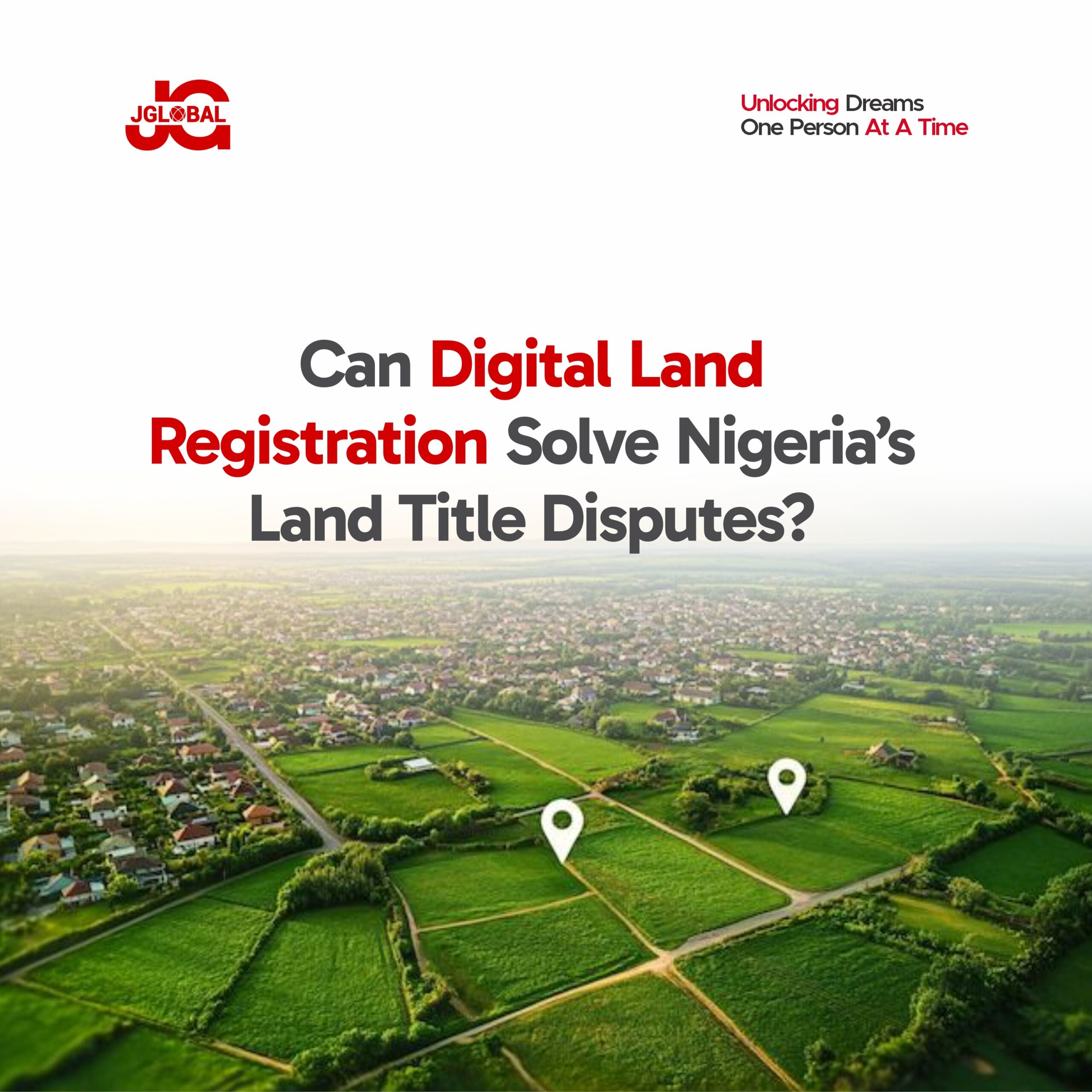Can Digital Land Registration Solve Nigeria’s Land Title Disputes?

Exploring the Role of PropTech in Real Estate Transparency.
Introduction
If you’ve ever tried to buy land in Nigeria, you probably know how complicated it can get. From double ownership to fake documents, land disputes are one of the biggest problems in the country’s real estate market. Many people have lost their money or land because they didn’t know the real owner or because there were no proper records to check.
But what if technology could change all that?
In recent years, something called digital land registration has started gaining attention. It’s part of a bigger movement called PropTech that’s short for property technology. These digital tools are being used in many parts of the world to make land buying safer and more transparent. Now, Nigeria is beginning to explore this too.
In this post, we’ll look at whether digital land registration can really solve Nigeria’s land title problems. We’ll break it down in simple terms, talk about the benefits and challenges, and see how PropTech might be the solution we’ve been waiting for.
Understanding Land Title Disputes in Nigeria
Land title disputes are a significant challenge in Nigeria, often leading to prolonged legal battles and financial losses. These disputes arise from various factors, including multiple claims to the same property, fraudulent documentation, and inadequate land records.
Common Causes of Land Disputes
- Multiple Ownership Claims: It’s not uncommon for a single parcel of land to have several individuals claiming ownership, each with seemingly valid documents like C of O or Land Survey
- Fraudulent Documentation: The prevalence of forged land documents complicates the verification process, making it difficult to ascertain genuine ownership.
- Inadequate Land Records: Many land transactions are not properly recorded, leading to gaps in official records and making it challenging to trace ownership history.
Impact on Individuals and the Real Estate Market
These disputes have far-reaching consequences:
- Financial Losses: Individuals may lose their investments due to invalid land transactions.
- Legal Battles: Resolving land disputes often involves lengthy and costly legal proceedings.
- Market Instability: Uncertainty in land ownership deters potential investors and hampers the growth of the real estate sector.
Challenges with Traditional Land Registration Processes
The conventional land registration system in Nigeria is fraught with inefficiencies:
- Manual Processes: Reliance on paper-based records increases the risk of errors and document loss.
- Lack of Transparency: Limited access to land records makes it difficult for stakeholders to verify ownership claims.
- Corruption: The absence of streamlined processes creates opportunities for corrupt practices, further complicating land transactions.
What is Digital Land Registration?
Digital land registration is the process of storing, managing, and accessing land ownership and property rights using computer systems instead of traditional paper records. This modern approach involves the use of blockchain technology and aims to make land transactions more transparent, secure, and efficient.
Why is it Important?
In Nigeria, over 90% of land remains unregistered, leading to disputes and hindering economic development. Experts estimate that this has resulted in more than $300 billion in “dead capital” assets that cannot be used for economic gain due to unclear ownership.
Benefits of Digital Land Registration
- Transparency: Digital records reduce the chances of fraud and multiple claims on the same property.
- Efficiency: Automated systems will speed up the registration process, saving time for both officials and landowners.
- Accessibility: Online platforms allow individuals to verify land ownership and access records from anywhere.
- Economic Growth: Clear land titles enable owners to use their property as collateral for loans, stimulating investment and development.
Nigeria’s Steps Towards Digitization
The Nigerian government, in collaboration with the World Bank, has initiated the National Digital Land Information System (NDLIS).
States like Lagos and Abuja are leading the way by implementing electronic land registration systems. For instance, Lagos has introduced the e-GIS portal to streamline land record management.
The Role of PropTech in Real Estate Transparency
What is PropTech?
PropTech refers to the use of technology to improve the way we buy, sell, rent, and manage properties. It includes tools like online property listings, virtual tours, digital payment systems, and blockchain-based land registries. These innovations aim to make real estate transactions more transparent, efficient, and secure.
How PropTech Enhances Transparency
- Verified Listings: Platforms like and Housebuy ensure that property listings are accurate and verified, reducing the risk of fraud.
- Blockchain Technology: By recording transactions on a secure, unchangeable ledger, blockchain helps prevent issues like double-selling and forged documents. This technology is already being explored in Nigeria to tackle land ownership problems.
- Virtual Tours and AI: Virtual reality allows potential buyers to tour properties remotely, while AI-powered platforms match users with properties that fit their needs, making the search process more transparent and personalized.
Real-World Impact in Nigeria
PropTech is not just a buzzword; it’s making a tangible difference in Nigeria’s real estate market. For instance, Casafrique offers detailed property information, including market trends and neighborhood statistics, helping buyers make informed decisions.
Moreover, the Nigerian real estate market is projected to grow by 7.52% between 2024 and 2028, reaching a market volume of $3.02 trillion by 2028. This growth is partly driven by the adoption of PropTech solutions that enhance transparency and efficiency.
Challenges and the Way Forward
While PropTech holds great promise, challenges like internet accessibility, digital literacy, and regulatory frameworks need to be addressed. However, with continued investment and collaboration between stakeholders, PropTech can significantly improve transparency in Nigeria’s real estate sector.
Potential of Digital Land Registration in Resolving Disputes
As Nigeria’s real estate market grows, so does the need for more secure and transparent land ownership records. Digital land registration offers a promising solution to the country’s long-standing land title disputes. But how exactly can it help? Let’s break it down.
- Reducing Fraudulent Transactions
One of the biggest challenges in Nigeria’s land market is fraudulent documentation. With digital land registration, each transaction is recorded in a secure, digital database. This makes it much harder for people to fake ownership papers or sell the same property multiple times. For example, using blockchain technology, once a property’s ownership is recorded, the information can’t be changed without leaving a trace, making fraud significantly more difficult.
- Clear and Transparent Records
Another major issue with traditional land registration is the lack of transparency. With paper records, it’s easy for important details to be lost, and for property histories to become unclear. But digital systems allow for easy, real-time updates to land ownership records. This means anyone can access verified, up-to-date information on a property’s ownership, making it much easier to avoid buying land with unclear titles.
- Faster Dispute Resolution
When disputes arise, digital land registration can help resolve them more quickly. Because digital records are easier to access, both buyers and sellers can quickly provide proof of ownership when needed, speeding up the resolution process. This is especially helpful for cases that go to court, where clear documentation can help prevent long legal battles.
Example: Lagos State’s Digital Land System
Lagos State, Nigeria’s commercial hub, has already begun implementing digital land registration. With their Lagos State Land Registry system, they aim to make land transactions more efficient and transparent. The system allows for online land searches, electronic payment for services, and even tracking of land documents.
This kind of system not only helps reduce fraud but also encourages investment by making land transactions safer and more reliable. With the success of projects like this in Lagos, other states in Nigeria are likely to follow suit.
Case Study: Ghana’s Digital Land Registration Success
Nigeria can also learn from other countries like Ghana, which has successfully implemented a digital land registration system. In Ghana, the digital system has helped reduce land disputes by improving the accuracy of land records and providing a single, accessible platform for land transactions. According to the World Bank, digital land registration has improved land security for many Ghanaians and helped boost the economy by enabling access to affordable financing.



